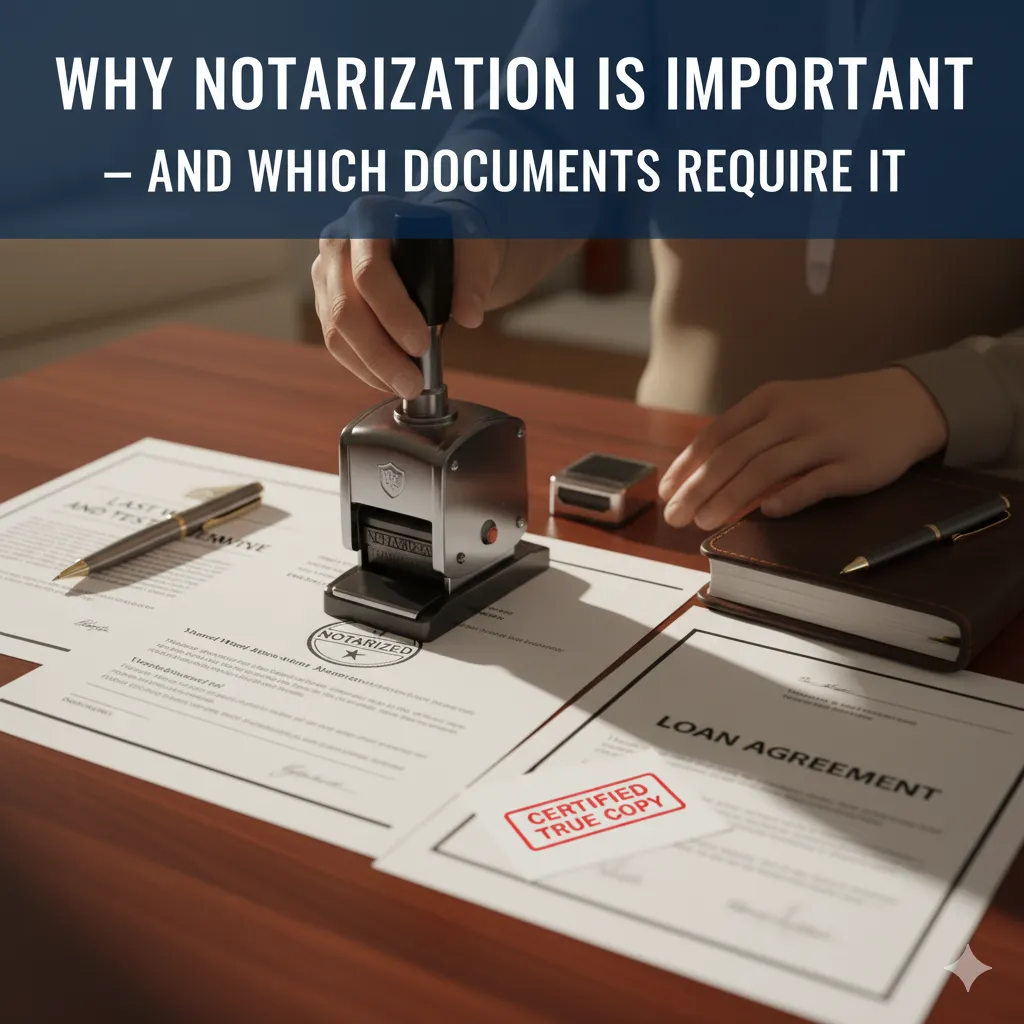Owning property is one of life’s biggest achievements — but it also comes with serious responsibilities. Whether it’s your family home, a commercial building, or an inherited estate, you want to ensure your property is protected, properly managed, and rightfully passed on to your loved ones.
Unfortunately, many people don’t take the time to plan legally. This often leads to unnecessary disputes, financial losses, or emotional distress for families later on. Two of the most important legal tools every property owner should understand are the Will and the Power of Attorney (POA).
In this post, we’ll explain what each one means, why they’re essential, and how they work together to safeguard your property and peace of mind.
1. Understanding the Basics
What Is a Will?
A Will (also known as a Last Will and Testament) is a legal document that states how your assets — such as property, money, and possessions — should be distributed after your death.
It allows you to:
- Specify who inherits your property (beneficiaries),
- Appoint an executor to carry out your wishes, and
- Provide guardianship instructions for minors, if applicable.
Without a valid Will, your property will be distributed according to the state or national intestate succession laws, which may not reflect your actual wishes.
What Is a Power of Attorney (POA)?
A Power of Attorney is a legal document that authorizes someone you trust (called the agent or attorney-in-fact) to make decisions on your behalf while you’re alive — usually when you are unavailable, ill, or incapacitated.
Depending on the type, a POA can give your chosen person authority over:
- Financial matters — paying bills, managing property, selling assets, etc.
- Legal matters — signing documents, representing you in official dealings.
- Medical decisions — in case you’re unable to make healthcare choices yourself.
2. Why Every Homeowner Needs Both a Will and a Power of Attorney
Most people think preparing a Will is enough. But in reality, both documents serve different yet equally important purposes — one protects your assets after your lifetime, and the other protects your interests while you’re alive.
Here’s why every property owner should have both:
A. Ensures Proper Transfer of Property
A Will ensures that your property is passed to your chosen beneficiaries — not just according to government rules. It eliminates ambiguity and prevents family disputes.
B. Protects You During Incapacity
If you ever face a medical emergency, accident, or age-related illness, a Power of Attorney allows someone you trust to manage your property and finances smoothly.
C. Avoids Court Intervention
Without a POA, your family might need to go through a court process to get permission to manage your affairs — which can be costly and time-consuming.
D. Reduces Legal Complications
Having both documents properly prepared and notarized helps reduce the chance of legal challenges, disputes, or misuse of authority.
E. Provides Peace of Mind
When your property and personal affairs are legally planned, you gain peace of mind knowing everything will be handled according to your wishes.
3. The Legal Importance of a Will
Let’s take a closer look at why a Will is a must-have for homeowners.
A. Prevents Family Disputes
Property disputes are common after a person’s death — especially when ownership or intentions are unclear. A clear, valid Will ensures there’s no confusion about who gets what.
B. Allows You to Control Property Distribution
A Will lets you divide assets exactly as you wish — for example, you can leave specific properties or shares to certain individuals, charities, or organizations.
C. Appoints a Trusted Executor
You can name someone responsible to handle all legal formalities, pay debts, and ensure your instructions are followed.
D. Makes the Probate Process Easier
Probate (the process of legally validating a Will) becomes simpler when the Will is properly drafted and witnessed.
E. Protects Minor Children and Dependents
You can specify who will be the guardian of your children or dependents — ensuring their care doesn’t depend on the court’s decision alone.
4. The Role of Power of Attorney in Property Matters
A Power of Attorney is equally crucial for protecting your property while you are alive — especially if you travel frequently, live abroad, or face health concerns.
Types of Power of Attorney Relevant to Homeowners
- General Power of Attorney (GPA)
Grants broad powers to your agent to handle financial and property matters on your behalf. Useful for temporary or business-related purposes. - Special Power of Attorney (SPA)
Gives authority for a specific act — for example, selling one property or signing one document on your behalf. - Durable Power of Attorney (DPOA)
Remains valid even if you become mentally or physically incapacitated. It’s ideal for long-term planning. - Medical Power of Attorney
Authorizes your chosen person to make healthcare decisions if you cannot do so yourself.
Key Benefits of Having a POA
- Smooth property transactions even when you’re not present.
- Continuity in managing finances and assets.
- Protection against misuse or unauthorized dealings.
- Legal recognition of the agent’s authority.
5. How Will and Power of Attorney Work Together
6. Common Mistakes Homeowners Make
Even with the best intentions, many people make critical errors when handling these documents. Avoid these mistakes to ensure your legal plans hold up in any situation:
- Not creating a Will at all — leaving property to be divided by default laws.
- Using generic templates — online samples may not comply with your state or country’s laws.
- Not updating the Will or POA — life events like marriage, divorce, or buying new property require updates.
- Not notarizing or witnessing properly — an improperly executed document can be declared invalid.
- Appointing the wrong person as Attorney or Executor — always choose someone trustworthy, responsible, and ideally familiar with legal or financial matters.
7. The Legal Process of Creating a Will or Power of Attorney
While the process can vary slightly depending on your jurisdiction, the general steps are:
Creating a Will
- List Your Assets and Beneficiaries
Include all your properties, accounts, and valuables. - Appoint an Executor
Choose someone reliable to manage your estate. - Draft the Will Clearly
Mention details of distribution, specific wishes, and any guardianship instructions. - Sign and Witness the Document
At least two witnesses must be present. - Notarize (if required)
Notarization adds authenticity and reduces future disputes.
Creating a Power of Attorney
- Decide the Type (General, Special, or Durable)
- Select a Trusted Attorney-in-Fact
- Draft the Document with Legal Clarity
Specify the scope of powers and conditions clearly. - Sign Before a Notary or Witnesses
- Register (if applicable)
Some states or countries require registration for real estate-related POAs.
8. When to Review or Update These Documents
Life changes, and so should your legal documents. Review your Will and Power of Attorney whenever you:
- Buy or sell major property,
- Get married or divorced,
- Have children,
- Move to another state or country, or
- Experience a major change in financial status.
9. Why Consult a Legal Professional
While you can find templates online, nothing replaces professional advice. A legal expert ensures:
- Your documents comply with the latest laws,
- They’re worded precisely to avoid loopholes,
- Proper witnessing and registration are completed, and
- Both documents complement each other effectively.
Professional help also brings peace of mind — knowing your property, family, and rights are fully protected.
10. Final Thoughts
Planning for the future isn’t about expecting the worst — it’s about being prepared.
Your Will and Power of Attorney together form the legal foundation for protecting your assets, your wishes, and your loved ones.
They make sure your property is managed responsibly while you’re alive and transferred smoothly when you’re gone — without confusion, stress, or conflict.
So if you haven’t already, take time today to consult a qualified legal professional and create your Will and Power of Attorney. It’s one of the most thoughtful and responsible decisions any homeowner can make.
Key Takeaway
“A home is more than a property — it’s a legacy. Protect it with a Will and Power of Attorney that reflect your intentions and secure your family’s future.”






